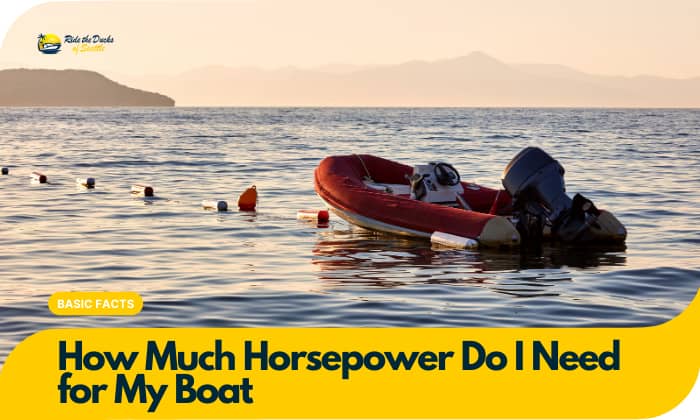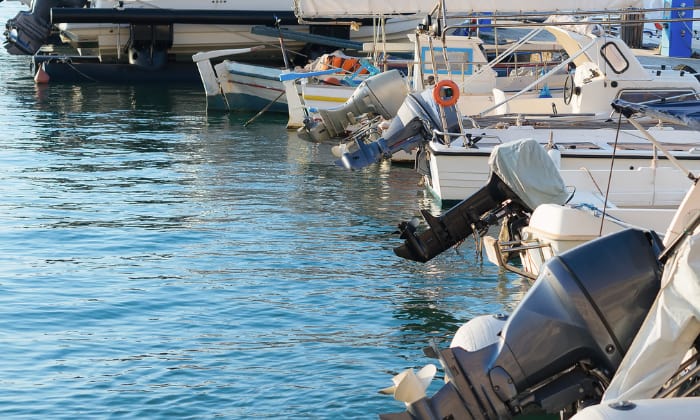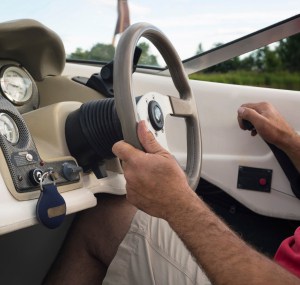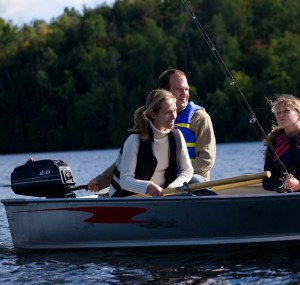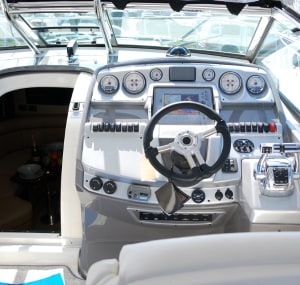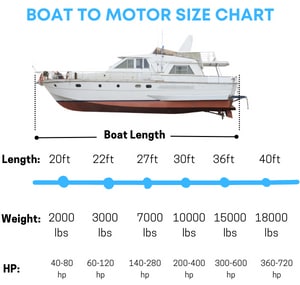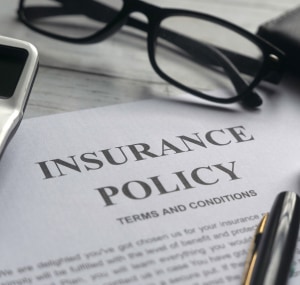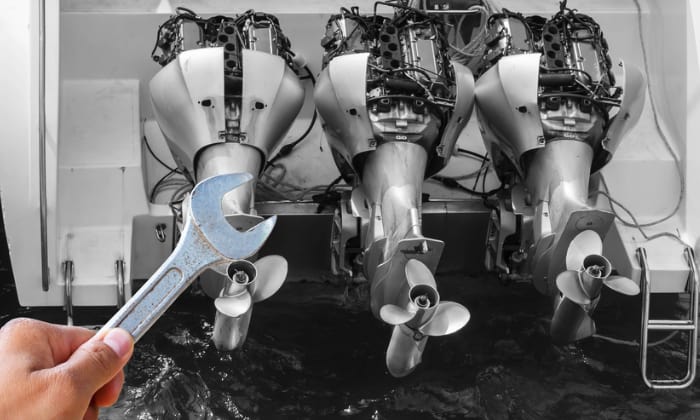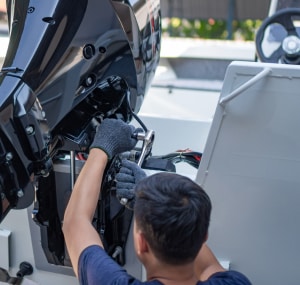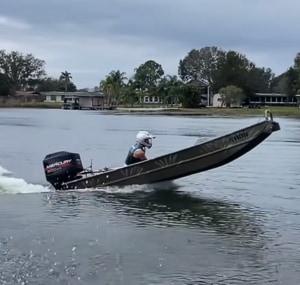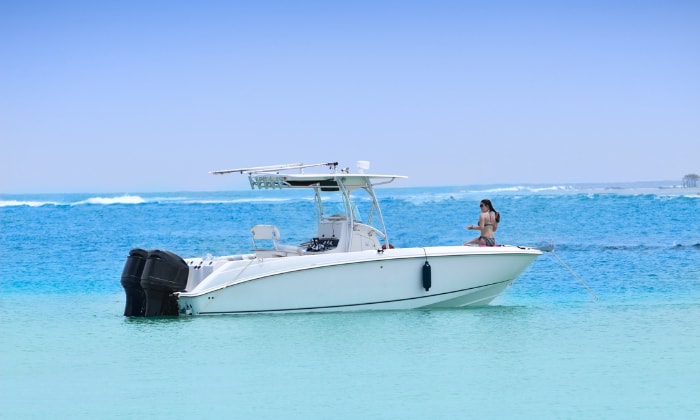Part of the joy of boating is feeling the wind slap your face as you travel at top speed. Unsurprisingly, many novice sailors ask, how much horsepower do I need for my boat? After all, horsepower translates to vessel speed.
Although no definite figures exist, one rule is the go-to for seasoned boaters. You can assign one horsepower for every 25 to 40 pounds of your boat’s weight. Hence, you can get a 32 to 50 HP motor for a 1,250-pound watercraft.
Of course, vessel weight is only one consideration, and there are others. So, kindly continue reading to learn more.
Table of Contents
What is Horsepower?
Horsepower knowledge will help determine the most appropriate boat engine without referring to a boat horsepower chart.
Eighteenth-century engineers defined horsepower as engine output equal to 550-foot-pounds/second. Unfortunately, several flaws in the measurement were observed, prompting other experts to propose that 1 horsepower is equivalent to 746 watts.
These definitions were insufficient. Hence, engineers also tried relating horsepower to torque or “turning force.” This “horsepower” formed the basis for an HP rating for boats.
Boat engine manufacturers use a “dynamometer” to measure the power (or torque) an engine produces after load application. The device also measures the number of revolutions or rotations per minute (RPM).
That is why engines always have the following format: “__ HP at __ RPM.” For instance, you can have 50 HP at 4500 RPM. In this case, the engine has a peak horsepower of 50, measured at 4,500 revolutions per minute.
Still too technical? Here is the simplest definition we could offer. Horsepower is engine power.
So, what determines horsepower in boat engines?
How to Determine the Horsepower Requirements for Your Boat
Answering the question, “what size motor can I put on my boat?” requires considering several factors.
1. Fuel efficiency
The conventional notion is that an engine with a high boat horsepower rating is a gas-guzzler. However, experts argue that everything depends on how you squeeze the throttle, just as how aggressive you are on a car gas pedal.
For example, if you maintain your diesel motor at 75% throttle or a petrol engine at 3,000 to 3,500 rpm, you can expect your high-HP boat engine to be more fuel-efficient than a low-HP motor hitting the redline or going 100% throttle.
Simply put, if you want better fuel efficiency when going at a fast speed, a high horsepower is preferable.
2. Passengers & Vessel use
Vessel weight increases with the number of passengers. For example, a fully-loaded 17 foot boat will require a high-HP engine. However, if a similarly-sized watercraft only has to accommodate one person, a lower HP motor will do just fine.
So, boats for personal or family use will do fine with a lower HP engine than watercraft for towing water skiers, wakeboarders, tubers, and wake surfers. Similarly, higher HP output is recommended for hauling cargo and heavy items.
Always consider your vessel’s principal use when choosing boat engine size.
3. Boat manufacturer limits
Your boat has a “capacity plate” specifying the vessel’s weight limitations and maximum recommended horsepower rating. You can check this information adjacent to the helm or your boat transom’s interior.
Alternatively, you can check the owner’s manual, especially for boats bought overseas. Online resources are also available. Reaching out to the boat manufacturer by going to their website’s homepage for contact information can also help you determine the best outboard motor size.
4. Horsepower-to-weight ratio
Trying to find the maximum horsepower for your vessel can be challenging, with so many variables to consider. One factor that can influence how much power your vessel requires is weight.
We already mentioned that the heavier the boat, the more power (or HP) it needs. So, how do we calculate maximum horsepower for a boat referencing its weight?
Calculating the ratio between horsepower and weight is straightforward. You only need your boat’s weight and its boat HP rating.
Suppose you have a 3,000-pound boat with a 200-horsepower outboard motor. Dividing 200 HP by 3000 pounds will result in 0.067 HP per pound (hp/lb). Here is a tip: the lower the “hp/lb” value, the faster the boat.
Knowing this value will help you choose the most appropriate HP rating in a boat to motor size chart. Of course, note that the boat HP rating must follow the 1 HP/25-40 pounds of vessel weight rule first.
5. Insurance considerations
Like everything else, higher-HP vessels demand higher insurance premiums. Most renter’s or homeowner’s insurance policy limits the coverage to boats with no more than 25 horsepower. Any vessel exceeding the HP rating requires different insurance coverage.
You might also want to know that most, if not all, insurers do not cover boats with horsepower ratings exceeding the manufacturer’s limits. You could reconsider mounting a high-performance engine only to plane a boat if you want adequate insurance coverage.
6. Federal regulations
The Department of Transportation and US Coast Guard created the “Horsepower Capacity” for the Code of Federal Regulations, capping the horsepower for vessels no more than 13 feet long at 40.
Moreover, the federal government uses a “boat HP calculator” to determine a watercraft’s maximum horsepower to ensure safe boating. The good news is manufacturers adhere to these rules, so sticking by the manufacturer’s limit should suffice.
A Formula to Remember
You can forget the online boat motor size calculator and memorize this formula instead.
- Boat horsepower = 25 to 40 pounds of vessel weight per horsepower
Let us assume you want an outboard motor for 20 foot boat weighing 4,000 pounds. In that case, the minimum horsepower rating you can get is 100 (4000 pounds ÷ 40 = 100 HP), and the maximum is 160 (4000 pounds ÷ 25 = 160 HP).
You can also use this formula on your sailboat, dividing its weight by 25 or 40 to get the ideal horsepower range. For instance, a 50-HP motor should be enough for a 2000-pound, 18 ft sailing vessel.
We mentioned the direct relationship of horsepower to speed – the higher the HP rating, the more powerful and faster the vessel. The next logical question is how boaters can convert HP to MPH.
Sadly, the formula for converting horsepower values to MPH equivalents does not exist. However, experts forward the following 1-horsepower equivalents.
- Personal watercraft (PWCs): 0.3 to 0.8 MPH/HP
- Small outboard engines: 0.8 to 1.3 MPH/HP
- Large outboard motors: 0.4 to 0.6 MPH/HP
For example, suppose you have a 20-HP outboard motor. You can safely assume your top speed would be between 16 and 26 MPH (0.8 MPH or 1.3 MPH x 20 MPH). Meanwhile, a 100-HP jet ski can go 30 to 80 MPH.
You can also multiply the MPH value by 1.609 if you want to convert MPH to KPH. For example, 50 MPH x 1.609 is 80.45 KPH.
Dangers of Overpowering
A boat HP rating guide exists to help you avoid exceeding your vessel’s horsepower limits and sidestep the following dangers of an overpowered watercraft.
1. Legal consequences
The federal government limits boat horsepower requirements. Although boat manufacturers adhere to the Code of Federal Regulations, exceeding the vessel’s horsepower limits can open you to fines and other penalties.
States, cities, municipalities, and other jurisdictions might also have boating laws that prohibit overpowering watercraft.
That said, some states, such as Washington, California, or Oregon, may not have strict regulations regarding exceeding the HP limits. However, overpowered boats can lead to overspeeding, which can open you to civil and criminal liabilities.
2. Risk of vessel damage
Boat manufacturers do not “guess” the information on the capacity plate. They study these parameters for your safety while ensuring the boat’s structural integrity can accommodate the maximum horsepower.
Replacing your engine with a more powerful unit might put unnecessary stress or pressure on the transom. You risk damaging your boat’s hull, which can result in costly boat repairs.
3. Risk of swamping
Another reason boat manufacturers limit engine horsepower is the importance of outboard motor weights relative to HP values.
For example, a 15-HP outboard motor might weigh 95 to 140 pounds, and the manufacturer limits the boat to this HP value. Replacing the engine with a 40-HP unit increases the weight to about 205 to 220 pounds.
The weight increase makes your boat’s stern heavier than the bow, increasing the risk of swamping.
Frequently Asked Questions
What boats are 2.0 to 3.6-HP outboard engines suitable for?
Two-horsepower to 3.6 HP outboard engines are ideal for portable watercraft, including inflatable boats, canoes, and tiny pontoons. These engines can propel small watercraft to about 5 to 9.5 MPH.
How fast can a 5.0- 6.0-HP motor go?
Twelve-foot inflatable boats, large canoes, and dinghies with 5HP to 6HP outboard motors can go 10 to 17.5 MPH with only one person aboard.
Conclusion
Determining the answer to the question, “how much horsepower do I need for my boat?” is never a walk in the park. Boaters must consider several factors in their boat horsepower decision.
Although boat manufacturers provide boat HP limits in capacity plates, fuel efficiency, passenger count, and watercraft purpose can still impact one’s decision. You might also consider the HP-to-weight ratio, insurance terms, and federal/state regulations.
We suggest sticking with the boat manufacturer’s maximum recommended HP ratings to ensure boating safety and avoid the pitfalls of an overpowered watercraft.
Related:

Ten years of enjoying countless trips on boats never made me love them any less! So I am here to put all those experiences into good use for other boaters who want to have a safe and fun trip with their friends and families.

